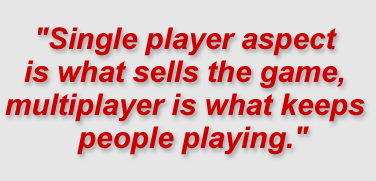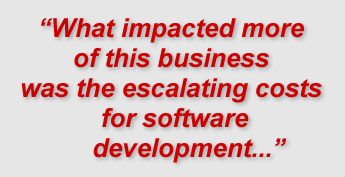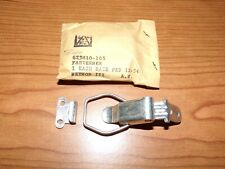Distribution and Publishing
20mm: With a few notable exceptions, simulation prices have remained in the $50 to $60 USD range for over ten years. What do you attribute that to and do you see it changing anytime soon?
Ssnake: Representing one of those “notable exceptions”, I won’t make predictions about the product or price policy of others. Let me just say that we think it was the right move for us to go with a $125 USD price tag (while at the same time offering extra licenses at a much reduced price). We haven’t noticed a discernible elasticity in demand as a function of the price. That may be different for others. Yes, it was a bit of an experiment for us, and it certainly required a lot of effort to explain and justify why we did this. But in our case it worked out. Having a solid product with a good reputation certainly helps, and we hope to do our customers’ trust and support justice with our future updates.
 Oleg: I hope. Real simulations eat a lot of time and money in development with its relatively small niche of market. High-end products should cost more. Like in the market of low- and high-end music devices. Look there for the differences.
Oleg: I hope. Real simulations eat a lot of time and money in development with its relatively small niche of market. High-end products should cost more. Like in the market of low- and high-end music devices. Look there for the differences.
Jason: It’s a heck of a lot less than that. More like $30-$40, or less. Unless we’re talking about a brand new title, but rarely have any been over $50 at launch historically. The unfortunate part is that the PC gaming market is strange in that it has not really kept up with inflation and with the rise of console games the prices of most PC games have gone down drastically due to lost market share. This trend has made PC flight sims really not an attractive genre for investors. There are no margins for anyone, developers, distributors, publishers, retailers or investors. However, the sim market is different from the others types of PC games and should not adopt business models or distribution models meant for Call of Duty.
Buckshot: As with any consumer product, it’s a balancing act between the cost of production and the size of the market against the cost per unit which the market can bear. Obviously more innovation and complexity is going to involve much higher production costs, which means higher unit costs particularly in a small community such as flight simulation. The other avenue is to release much less ambitious products which are evolutions or add-ons for older products at a lower price point.
Dante: The software is possibly the cheapest part of a simmers hobby. He has probably a few hundred dollars in control sticks, pedals, extra monitor, perhaps a homebuilt cockpit in some cases, not mentioning a strong machine (8GB of RAM, i7, latest offering from NVIDIA or ATI, etc). So, a couple more dollars in the price range of a detailed, specialized study sim, is easily justified if you put on the paper how much it costs to develop (the same as any other AAA game title) but without a strong mainstream sales figure to back it up! Which sums up basically why sims are so few and far between.
Polovski: Yes, but now people have to charge for add-ons or bolt-ons, extra aircraft, etc. It’s the only way to carry on with simulators at the moment. Everyone ultimately knows that most decent sims are worth $100’s in “replayability”, given the detail and resources needed to make them and their relative scarcity. Some last many many years. But psychologically people do not want to pay $100 or whatever for the initial package but are happy to buy the initial product and then add to it over time.
20mm: Something that simmers still seem to crave is the printed manual, reminiscent of the Jane’s Combat Simulations days, Falcon 4.0with its binder, and similar. Obviously we are not going back to the days where a simulation will be packaged with a bound, 200+ page manual. But what is your experience with aftermarket manuals and their publishing?
Oleg: Most people, especially young, now even don’t read books! The Internet is the main source for them now. So better to integrate any manuals and help into the product in an electronic way. It doesn’t matter which type of doc it will be. Another problem: most users never read manuals at all so in many cases the best way is to make an easy-to-understand interface with integrated help, educational tracks, etc. Also, when there is just one object of simulation (a study sim) there is a possibility to make a big manual just for this one object. But when you have many — it’s a real problem to make for all of them. Lets look for example at IL-2. IL-2 has become a flying encyclopedia now for the 10 years it has been on the market. Without counting manuals, readmes, additional readmes for the add-ons with new planes, etc. It is a great amount of work that is done over time and which isn’t possible to make from the beginning in a document. The best way I’ve found is how all camera manufacturers approach the problem. For example, you may download the PDF manual and print what you want. In modern times it is more accurate with all changes that may come in future with the changes of the product itself.
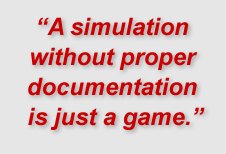 Ssnake: A simulation without proper documentation is just a game. Users should be given the necessary information to decide whether the underlying model is valid or not, even though probably only a minority actually bothers to check these things.
Ssnake: A simulation without proper documentation is just a game. Users should be given the necessary information to decide whether the underlying model is valid or not, even though probably only a minority actually bothers to check these things.
We still send out 100 page manuals with each copy, and we’re currently working on a third, revised edition which will probably grow in size. Documentation is an important part, and what we couldn’t cram into the printed manual we released as additional PDF and Word documents; there’s a Wiki at SteelBeasts.com, and link lists.
Buckshot: As mentioned previously, the unfortunate reality is that large printed manuals if shipped with a simulation, will in most cases lift the unit cost to a point which is not sustainable. We certainly believe that a printed manual as an option is a desirable, however as a standard feature, this is one of those items lost to the “good old days”.
Polovski: Either way it’s expensive to make (either publish or print on your color inkjet printer), so most are happy with PDFs or web based manuals as a compromise. We haven’t made printed manuals although we include PDFs in the sim install folder, and extensive FAQ and help online.
Flexman: I love a good manual and would pay extra for a game I wanted to play. Print runs in volume bring the cost down. But since simulations are often changing with patches early on, printed manuals can become out-of-date. It makes sense to wait a while and do limited after-market manuals at a premium. But it is very expensive to do.
20mm: Broadband connections have significantly changed the methods of distribution. Whereas previously, it was a case of going to a retail store or buying from an online vendor, today it seems more and more developers are going the digital distribution route. Is the retail store becoming a thing of the past for simulation purchasers?
Oleg: Yes.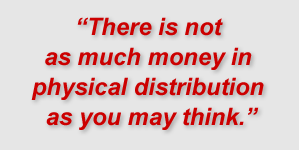
Jason: I think (I could be wrong though) that I am probably the only person on this roundtable with serious distribution experience and I can tell you that there is not as much money in physical distribution as you may think. It’s a part of your overall strategy, but is not the fantastic thing that is used to be for PC flight sims. The market has shifted dramatically and the sim community will hopefully find peace with it at some point and adopt a more digital future.
Ssnake: We can’t do without mail order, but we certainly can live without retail; digital distribution is super-easy, at least as soon as we have sent a CodeMeter stick to our customers (the USB device for license management). Now that we can issue new licenses in an automated manner, all practical obstacles for the digital distribution of updates are gone.
Buckshot: Developers are searching for the most cost-effective means of delivering products to the consumer. This again ties in with the previous questions, the older distribution methods tied up huge percentages of profits in the supply chain, if more effective means can be utilized, the development budget can be higher while keeping the cost to consumer more manageable.
 Dante: According to our survey, the retail was still strong. Simmers are still collectors at heart, they want the physical thing. 🙂 So, I was glad that our Publisher will allow a full retail release as our third installment. It is something very important to many people in this public.
Dante: According to our survey, the retail was still strong. Simmers are still collectors at heart, they want the physical thing. 🙂 So, I was glad that our Publisher will allow a full retail release as our third installment. It is something very important to many people in this public.
Polovski: Some people still like a physical box / DVD (as a backup too) so that’s still something people want but yes times are moving on and finally most people in most modern countries have broadband — it just gives and players options — a little like more buttons to press in the sim itself, options, options.
Flexman: It’s cheaper to publish electronically of course and more convenient too. It would be nice to have a publisher step in early and provide support. Given the difficulty we’ve had in finding real funding, it has been a constant battle, and having to pay for everything out of our own pockets I’m not exactly inclined to hand a publisher a percentage on completion. I really like how Third Wire does their own store. It’s self-contained. Conversely a digital download service like Steam reaches millions of PC users, even if uses don’t like the service it’s a way of reaching out to a worldwide market very quickly. Plus they provide metrics from users of the service as well as an SDK for delivering DLC. There’s more opportunity going digital.
20mm: How much do you think a digital game distribution title would stand on its own, or is it a preferred combination of digital distribution with an additional DVD in the mail if the customer so desires?
Buckshot: At this point we believe there still is much perceived value in holding a physical product. We do believe that as more and more software moves to a pure download model, that this will become less of an issue, in the present day though, I believe it is important to at least offer the option of a physical product.
Polovski: I think you need the option of physical DVD still, many people lose their downloads (I know from experience ;)) so you have to buy “download insurance” or remember to make a backup. A physical disc is something you can usually find quickly and it’s somehow reassuring.
Oleg: Both are preferable, but it is also dependent on world regions.
Flexman: We’re happy to mail out DVDs for those with bandwidth constraints or have offline gaming PCs. But it’s an exception rather than a rule.
Jason: Right now Digital is taking over Retail distribution, but you still need a combination of both methods for the time being. A DVD in the mail, although nice, is really not necessary. Just burn your own or put it on other media. Digital distribution is better for the developer as they get to keep most or all of the money.
Ssnake: About 75% of our customers preferred the pure download over the DVD. We won’t abolish the DVD however since we need to send out the CodeMeter stick and the printed manual anyway for the first order. After that point, we simply offer both options in the web store, and then it’s the customer’s decision which way to go.
20mm: Is it different for PC versus console titles?
Dante: Recently I’ve read on Kotaku news site, that retail on consoles is still 80% or more… So, it is indeed different, as PC has stronger digital than console (but consoles are pushing for it with services like PSN and the Xbox and Nintendo equivalents).
 Buckshot: I think both are evolving to digital distribution at similar rates for the same reasons.
Buckshot: I think both are evolving to digital distribution at similar rates for the same reasons.
Polovski: Yes but that is changing with more online on-demand services hitting the consoles.
Jason: Console is still very much Retail driven and it has virtually killed off PC games at Retail. Not to say they are better, just easier to get into thanks to the sameness of the console designs. Only the mega-titles for PC like WOW and COD can really get a huge benefit from physical PC retail and preferred retailers only care about those titles guaranteed to turn a profit or in some cases have a known publisher attached to it. When you are independent like 777 Studios, buyers at popular retailers have no idea who you are and have no interest in what you have to offer. It’s very hard to get them to listen to you. To get into these retailers you end up using an aggregator and your percentage of the profits go way down. In some cases, you’re better off selling fewer units direct on your site and keeping 100% of the revenue for yourself.
20mm: If Developers move more-and-more to digital distribution, does that effectively cut out the role of a Publisher?
Jason: Yep.
Flexman: Publishers can have different roles. To me a publisher puts up a stake to fund development for specific platforms and have control over content, development and revenue. I don’t see that aspect changing at all for larger projects. As they take on more financial risk they need greater controls. But clearly as smaller indies move direct to market it cuts out the need for a publisher. Let’s not forget that Steam and Direct2Drive are publishers and doing very well.
Oleg: Yes. Already. The publisher now should be more of an investor in the project development than the distributor.
Dante: Not at all. There are things that the developer can’t do at all, because it is not the developers speciality. Basically, publishers are better than developers to sell things, no matter if in a digital or physical way.
Polovski: Potentially so the publisher has to offer more for less. More marketing options for example. Many publishers also take a large percent so that will have to change to encourage more of the smaller developers — that has to help the smaller developers and sims especially.
Ssnake: You still need to organize a marketing campaign, you still need to fund the actual development. There’s still a role for publishers.
Buckshot: If the trend continues as I believe it will, then I would say that the successful publishers will be those that evolve with the change in distribution methods, finding ways to add value to the supply chain while keeping in mind the constraints discussed previously.
20mm: In the past, it was fairly common for a Developer or Publisher to release a demo of an impending release. Many gamers were excited about a demo release and it certainly did create a “buzz” about what the release version would be like. More recently, it seems there have not been as many pre-publishing demos. Is the day of the demo over?
Flexman: No, definitely not. I like the old ID model of releasing the first three levels of DOOM for free, but paying for the full meal if you’re hungry for more. Most demos are not like that today. You need to be very careful with demos though. Some are quite underhand giving you levels and difficulty settings that are different from the full game. That seems slightly dishonest. There’s also the risk that your demo stinks. It’s also a bit hard to provide a demo of a simulation. A lot of games use a concept of “map” loading so content is compartmentalized. And therefore there’s not much risk of some hack opening up the complete game.
Buckshot: I believe that the demo is certainly not dead. Demo’s are an important part of the marketing arsenal, it’s a matter of weighing up the development costs of producing a demo, the type of market, and many other factors, demo’s are something I would evaluate on a development by development basis.
Oleg: I have done only one demo version. It was due to the fact that Ubisoft bought Bluebyte and we had time to develop a special demo for IL-2.
Ssnake: With YouTube you can just as well illustrate the content, even in high resolution. We received compliments for our demo even three years after Steel Beasts was released a decade ago, combined with inquiries when we would release the next demo. Even without a demo, I don’t remember more than one case where a customer demanded his money back in the past five years, and after given proper assistance, even he decided to keep his copy.
 Dante: The demo needs a lot of post-release “nursing”, same as with a game release at all, but without having any revenues out of it to back it up for the trouble. This partially explains why they’re getting less popular.
Dante: The demo needs a lot of post-release “nursing”, same as with a game release at all, but without having any revenues out of it to back it up for the trouble. This partially explains why they’re getting less popular.
Jason: Not over, but pre-publish demos will become more rare for sims in my opinion and devs may opt for the pay to play the Beta approach. Plus simmers can be so critical that a Demo before release could really hurt you unless it’s really good.
Polovski: I think it must depend on the content in the title itself. Some such as ours for example are detailed and large/encompassing, and therefore hard to get a demo that shows that whilst restricts the user some to encourage purchase — tricky. Even in our situation it could still be done, but would need a good chunk of time to be carefully thought over. It could be detrimental to give the wrong impression so we shall see, but no, the day of the demo is not over.
20mm: Eagle Dynamics has offered pre-purchase of DCS: A-10C Warthog which includes multiple “Beta” updates as development progresses. What are your thoughts on this and could you see this working for your next product?
Jason: This was a good move and only foreshadows what is to come in this genre.
Ssnake: Well, it’s an honest approach, and if people are really excited about it, why not. You get feedback from many people with many platform configurations, which you would eventually need to get anyway. What would be released as a first or second patch can now be worked in before it is officially released. One risk however is in zero day exploits — people start to hack your title while it is still in beta and then offer it as a torrent or so. The decision to go with a public beta isn’t a no-brainer.
Flexman: I remember this question coming up in the SimHQ forums for Combat-Helo. It’s not something we need to do, our software is an order of magnitude simpler and therefore not so much testing is required. When we finally go live we know the game won’t ever be finished, in the same way MMOs are never finished. The intent is to continually augment and tweak, carry over that code into future generations of the game. Like art, it’s never finished, only abandoned.
Oleg: It’s one of the possible additional ways. But it is working for covering the current product expenses, not the next…
Polovski: That’s not something we’d consider currently — larger beta test groups are fine if the tests are a from a well-behaved controlled group but all sorts of random info coming in from all users would be bad.
Dante: It was a clever way to have backing for a lengthly development cycle in the current dry economic climate.
20mm: Consumers vote with their wallets, but simulation consumers also like to (strongly) voice their opinions in Forums. In your experience, how closely aligned are your sales statistics and trends with what you read about your products in enthusiast forums?
Dante: They’re very vocal indeed, and their opinions probably strongly influenced products like DCS: A-10C Warthog and I have to say they influenced JT as well. We’ll see soon if they’re aligned with sales statistics, stay tuned!
| SimHQ Special Feature / The Future of Simulations / Table of Contents | |||
|
|
|||
| Page 1 | Page 2 | Page 3 | Page 4 |
| Introduction Participants Consumer Simulations |
Software Development | Software Development (continued) |
Controllers and Peripherals |
|
|
|||
| Page 5 | Page 6 | Page 7 | |
| Multiplayer | Distribution and Publishing | Copy Protection and Intellectual Property | |
|
|
|||


